Healthy habits that can help prepare you for menopause and beyond
There are a few things that researchers and other experts want us to focus on in menopause and beyond


If you're approaching or going through menopause, some lifestyle changes can be more important than others to help reduce the severity of symptoms and boost longevity.
Some habits - like quitting smoking, eating healthily and getting 10,000 steps in - are beneficial throughout our lives. They lower our risk of serious diseases like cancer and boost our cardiovascular health, and they are among those researchers and other experts want us to focus on.
Here, we reveal the other health habits worth including in your routine and picking up to boost overall mental and physical health in the lead-up to menopause and beyond.
Healthy habits to adopt before or during menopause
Walk regularly

There are so many benefits of walking for those in menopause. Not only has this basic exercise been proven to lower the risk of breast cancer by 14% in a study by Brigham Women's and Children's Hospital and Harvard Medical School, but it can help to strengthen bones that naturally weaken when we're not benefitting from oestrogen's protective properties.
Speaking to woman&home previously, board-certified orthopaedic clinical specialist Dr Vikash Sharma said: "If you want to build bone density, you need to increase the impact to stimulate change and new bone cells to grow." Walking regularly can help you do this.
Eat calcium-rich foods

Calcium-rich foods - like milk, cheese, yoghurt, beans and lentils - are some of the best foods to eat during menopause as they can help ward off diseases like osteoporosis and prevent bone loss when combined with impact exercise, such as walking.
Most women need about 1,200 mg of calcium per day, most of which can be consumed through foods. However, speak to your doctor before changing your diet or taking any new supplements.
Sign up for the woman&home newsletter
Sign up to our free daily email for the latest royal and entertainment news, interesting opinion, expert advice on styling and beauty trends, and no-nonsense guides to the health and wellness questions you want answered.
Eat foods high in fibre
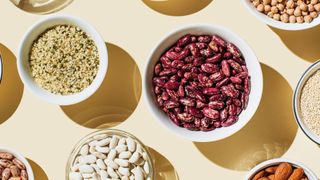
Fibre is one of the most essential nutrients as it helps our digestive systems to work effectively. While this is important at any time of life, it's particularly important in menopause as declining hormone levels can wreak havoc on the digestive system.
A diet rich in high-fibre foods can also help with weight management, blood sugar levels, mood, gut health, and heart health by reducing cholesterol levels and helping to lower high blood pressure. It's also thought to help relieve hot flushes, according to a study in the Journal of The Menopause Society.
Eat foods high in healthy fats
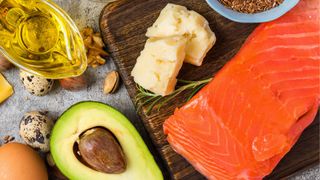
Healthy fats are another important food group in menopause and beyond. According to a review in the Nutrients Journal, higher levels of omega-3 fatty acids are associated with better health in postmenopausal women.
Foods rich in healthy fats, like mackerel, salmon, anchovies, chia seeds, and hemp seeds, can help the body absorb important nutrients and reduce the intensity of some menopause symptoms.
Eat whole grains
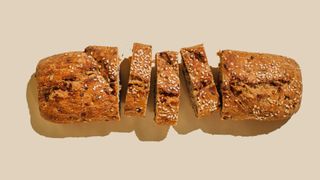
Whole grains (such as brown rice, whole wheat bread, oats, quinoa, and rye) are high in fibre and vitamin B, making them worthy a spot on your plate at any time of life. However, in menopause, they have been linked to a lower risk of heart disease, cancer, and premature death in a study in the British Medical Journal.
In another study associated with the Universidade de São Paulo, researchers found that women who eat more whole grains (along with unprocessed foods and vegetables) were less likely to have severe menopause systems.
Cut back on alcohol

Unfortunately for those who enjoy drinking, alcohol and menopause aren't a good combination for several reasons. Hot flushes are more likely as alcohol dilates the blood, making vessels wider. In turn, this makes the skin feel warmer and the sweat glands bounce into action, aka, a hot flush.
There's also a strong link between alcohol, menopause and increased rates of anxiety, with symptoms often coming to light as progesterone and oestrogen levels start to decline in perimenopause.
The negative side effects of alcohol also occur in menopause due to age. Dr Kate Burns, a menopause specialist and GP, previously told woman&home: "As we get old, our bodies lose water volume, so we're not as able to disperse and dilute alcohol. This makes us more vulnerable."
If you have any concerns about your drinking habits, speak to your doctor.
Cut back on caffeine

Much like alcohol, excessive caffeine intake and menopause don't go well together. Caffeine has been shown (in a study by the Mayo Clinic) to trigger some menopause symptoms in post-menopausal women, like hot flashes and night sweats, as it increases overall body temperature.
However, minimal caffeine consumption has been shown to have benefits for those in menopause, helping to boost energy levels.
Improve your sleep hygiene

If you haven't revamped your sleep routine in the last couple of years, now could be the time. Famously, one of the most common menopause symptoms is sleep issues. This is often put down to hot flashes, night sweats, and mood changes, which are caused by changing hormone levels.
To improve your sleep hygiene in menopause, try sticking to a rigid sleep routine and go to bed and wake up at the same time every day, even if you can't get to sleep right away for the first few weeks. This can help regulate the body's internal clock and improve general sleep quality.
Changing your bed sheets may also help. "By ditching your satin, brushed cotton or synthetic bedsheets for something more lightweight and breathable, such as cotton or linen, it will reduce the temperate in bed, helping you to get a quality night’s sleep," says Alison Jones, a sleep consultant and expert at Sealy.
Lower your stress levels

Stress triggers the body's 'flight or fight' response, which can cause some menopause symptoms - including hot flushes, sleep issues, mood swings, digestive problems, and brain fog - so it's important to keep stress to a minimum where possible.
One way to lower your cortisol levels is to participate in regular exercise. "It's great for the mind and body, reducing the risk of cardiovascular disease, counteracting depression, and dissipating stress, all through the balancing of stress hormones [like cortisol]," Dr Natasha Fernando, a GP and hormone specialist, previously told woman&home. Relaxing exercises, like doing yoga every day, and meditation are particularly good for this.
Stop smoking

Most people know the risks associated with smoking - but did you know it can trigger early menopause? According to research linked to University of Massachusetts Amherst, smoking cigarettes may impact ovarian ageing and follicle reserve, and smoking has been linked to an earlier menopause age in several populations.
Smoking can also make some menopause symptoms worse, especially those affecting the skin, hair and nails.
Do strength training
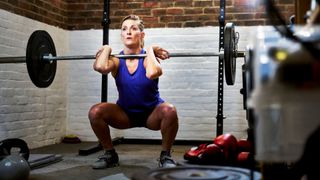
There are many benefits of strength training for women - particularly during menopause. Starting from the early days of perimenopause, declining oestrogen levels increase the risk of diseases like osteoporosis as we lose out on the protective effects of this hormone on our bones.
Strength training - along with eating a balanced diet - can prevent bone loss, reduce the risk of osteoporosis and help us maintain mobility throughout life.
Drink plenty of water

Much like eating a balanced diet rich in fruits and vegetables, exercising and getting enough sleep, it's very important to drink plenty of water in menopause and beyond. While hydration is essential at all times, hormonal changes in menopause lead to symptoms like hot flashes and night sweats, which increase water loss.
Replenishing this water loss is needed to reduce the risk of symptoms like tiredness, headaches, dry skin and UTIs, as well as regulate body temperature and keep digestion working smoothly.
Hormonal changes can lead to increased water loss through symptoms like hot flashes and night sweats, making it vital to replenish fluids and manage symptoms like headaches, fatigue, dry skin, and urinary tract infections, while also supporting overall health by regulating body temperature, aiding digestion, and maintaining healthy skin elasticity.
Consider a vitamin D tablet

Vitamin D is considered to be the most important vitamin for menopausal women, says Dr Louise Newson, of Balance, a menopause support platform for women, because of the effect it has on the muscles, teeth, and bones.
With menopause comes a decline in oestrogen levels, which can have a negative effect on bone density if other measures - like making sure you have enough vitamin D in your diet - aren't taken.
Keep a healthy weight

Keeping a healthy weight by eating a balanced diet, sleeping well, moving regularly, lowering stress and exercising regularly are good habits to get into ahead of menopause. A decrease in hormone levels typically causes body fat to store differently, focusing around the abdomen, which can contribute to a higher risk of heart disease, diabetes, and some cancers, per Harvard Health.
It's also been shown to make some menopause symptoms - such as hot flashes - worse, per studies led by the State University of Campinas.
Try meditation

Meditation isn't the route to a stress-free routine for everyone, but if you're struggling with feeling overwhelmed and keeping your cortisol levels low, it might be worth a try. It doesn't have to be meditation sat down on a yoga mat either - forms of mindful movement can have the same effect, such as walking meditation or running meditation.
"There is a dynamic mind-body connection as you run. You're focusing on breathing, the rhythm of your strides, and the sensations in your body, which can foster a holistic experience," personal trainer Lucie Cowan, who works with Third Space, previously told woman&home.
Talk to your friends

While talking about menopause was taboo in years gone by, there is so much more awareness and understanding of its many symptoms and how these can affect people in different ways.
Whether you're struggling with symptoms or just need those around you to be aware of the changes you're going through to better support you, it's important to open up and talk with friends, family, and loved ones about how you're feeling and what you need.
Try yoga

Much like meditation, this mindful practice isn't for everyone. But, if you're not into weight training and you're struggling with stress during perimenopause and beyond, it's certainly worth trying some yoga stretches for beginners at the very least.
Per research led by the University of Mississippi, a simple yoga workout has been proven to boost muscular strength, flexibility, respiratory and cardiovascular function, and reduce feelings of stress, anxiety, and depression, as well as improve sleep and general wellbeing.
Identify triggers for hot flushes

Alcohol, smoking, caffeine, spicy foods, hot weather, sudden changes in room temperature, tight clothing, hot drinks, stress and anxiety - these are all common triggers for hot flushes.
However, what triggers a hot flush for one person might not trigger a hot flush for another. It can be useful to work out what triggers your hot flushes so you know what lifestyle changes you need to make. Keeping a diary can help with this.
Eat plenty of fruit and vegetables

A balanced diet is very important throughout life - but particularly during the menopausal transition and afterwards, when we need more nutrients typically found in fruit and vegetables.
Fruits like apples and bananas contain vitamins and minerals like potassium, which can help keep blood pressure stable. Leafy green vegetables have lots of calcium and vitamin K, which can support bone health.
Get outside in the summer

Want an excuse to lay out in the garden, take a trip to the local park, or book a holiday somewhere hot? Having plenty of sunshine on the skin when you have a chance is a positive habit to instil during perimenopause and beyond. While it's important to stay protected from harmful UV rays with sun cream and so on, getting out into the sun helps keep our circadian rhythms (the sleep-wake cycle) in check, which can improve sleep.
The sun is also vital for producing feel-good hormones in the body, which is why we tend to feel happier in the summer.
Focus on the positives

While there are limitations to positive thinking, adopting a positive-first mindset is a good life habit to get into. That doesn't mean thinking that everything will be okay regardless of what's happening though - according to a study led by the London School of Economics and Political Science, grounding positive thinking in reality and setting "reasonable expectations" for outcomes can improve overall wellbeing.
The easiest ways to include more positive thinking in your life include setting achievable goals, reframing negativity, talking to and about yourself positively, recognising the positive and negative aspects of a situation and practising gratitude.
Discuss hormone replacement therapy (HRT) with your doctor

There are lots of ways to deal with menopause symptoms, starting from the early days of perimenopause right through to postmenopause, and one of those is hormone replacement therapy (HRT). It won't be right for everyone and there are plenty of alternatives to HRT available, but per the NHS, there are lots of benefits if you're struggling with certain symptoms.
Talk to your doctor to discuss your options.
Keep an eye on your blood pressure
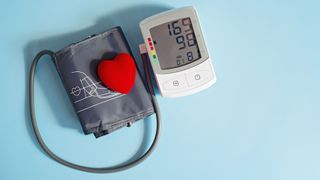
Blood pressure typically rises around the time of perimenopause, with studies finding a "significant difference" in systolic blood pressure between pre and post-menopausal women.
This is mainly down to the hormonal changes happening in the body as well as weight gain and salt sensitivity.
Learning how to lower blood pressure can be useful to manage the condition - but as always, it's important to regularly attend check-ups with your doctor to monitor blood pressure and other changes.
Consider a magnesium supplement

As the body's magnesium levels tend to decline around menopause, supplementing with magnesium has been proven to help with menopause symptoms like hot flushes, mood swings and sleep issues.
There are various types - such as magnesium oxide, citrate, chloride, and glycinate - and additional magnesium may not be suitable for everyone, so talk to your doctor or a pharmacist to decide the best option for you.
Prioritise foods rich in phytoestrogens

Phytoestrogens are plant compounds in food that may help reduce the severity of some menopausal symptoms as (limited) research suggests they can mirror the effects of oestrogen on the body.
Foods containing phytoestrogens include soy products, such as edamame, tofu, and tempeh; fruits and vegetables; grains like barley, oats, and wheat germ; and seeds.
Eat plenty of protein

There's plenty of research to back the benefits of eating more protein as you approach menopause and beyond, with a study in the American Journal of Nutrition finding that protein intake was linked to healthy ageing.
Protein is one of the body's building blocks and along with regular impact exercise and strength training, it can help maintain a healthy muscle mass.
Eat foods high in vitamin K

Vitamin K is one of the more unknown vitamins, compared to the likes of vitamin C and D. It's found in leafy green vegetables, soybeans, and some dairy and meat products.
Studies linked to Bozova State Hospital suggest it helps to improve bone health and reduces the risk of fractures in postmenopausal women at risk of osteoporosis.
Keep your gut healthy
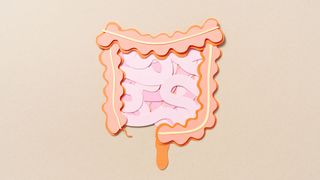
Gut health has become a buzzword in the world of health and wellness in recent years - but it's very important. "The gut microbiome is increasingly recognised as a root cause or contributor to many chronic conditions that can impact healthy ageing," says Sonia Khan, senior pharmacist and nutrition expert at FeelGut.co.uk.
"When the balance of beneficial and harmful bacteria in the gut is disrupted, known as dysbiosis, it can trigger systemic inflammation, impair immunity, and disrupt metabolic and cognitive functions. These effects are linked to several chronic diseases common in older adults," she says.
Avoid sweeteners

You might think that an artificial sweetener is a better choice than a classic sugar sachet where health is concerned - but think again.
Artificial sweeteners have been linked to triggering hot flushes and night sweats in some women and those who opt for these sweeteners more often than not have been found to have a higher risk of weight gain, type 2 diabetes, and cardiovascular disease in research linked to Purdue University.
Reduce processed food intake

Ultra-processed foods - including popcorn, doughnuts and crisps - carry a direct link to an increased risk of serious diseases, including some cancers. However, in perimenopause and beyond, it's also linked to an increased severity of symptoms like hot flushes.
A high consumption of sugar-sweetened drinks and processed meat (sausages in particular) was associated with memory and concentration issues and somatic symptoms, like tiredness and fatigue, in the study linked to Universidade de São Paulo.
Vary your exercises

As much as yoga, running, and strength training all have their benefits, there can still be 'too much of a good thing' and just doing one means you could miss out on the health benefits of the others. So, it's important to diversify your exercise habits to build an all-round exercise routine.
In general, the NHS recommends doing 150 minutes of moderate-intensity exercise or 75 minutes of vigorous intensity exercise every week.
Try cold water swimming

Cold water swimming is pretty controversial - there are plenty of benefits of wild swimming and cold water immersion during menopause and beyond, but it's not many people's idea of a good time.
One study from University College London found that half of participants who were going through menopause found cold-water swimming "significantly" reduced their anxiety, mood swings, low mood, and hot flushes. So, even if you can only manage 20 seconds under a cold shower, it's worth a try.

Grace Walsh is woman&home's Health Channel Editor, working across the areas of fitness, nutrition, sleep, mental health, relationships, and sex. She is also a qualified fitness instructor. In 2025, she will be taking on her third marathon in Brighton, completing her first ultra marathon, and qualifying as a certified personal trainer and nutrition coach.
A digital journalist with over seven years experience as a writer and editor for UK publications, Grace has covered (almost) everything in the world of health and wellbeing with bylines in Cosmopolitan, Red, The i Paper, GoodtoKnow, and more.
-
 What is pink mould and how can you get rid of it safely? Experts share advice
What is pink mould and how can you get rid of it safely? Experts share adviceWhile you may not have even heard of pink mould, it's relatively common and important to know how to tackle it quickly
By Emily Smith Published
-
 The White Company's Hypoallergenic Mattress Topper is surprisingly affordable and a dream to sleep on
The White Company's Hypoallergenic Mattress Topper is surprisingly affordable and a dream to sleep onThe The White Company Hypoallergenic Comfort Topper offers a gentle, supportive layer to your sleep set-up for a surprisingly affordable price.
By Laura Honey Published